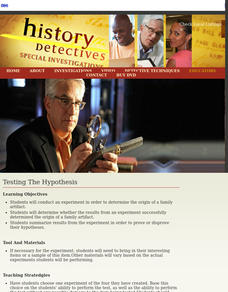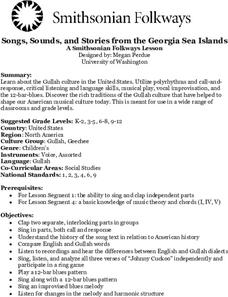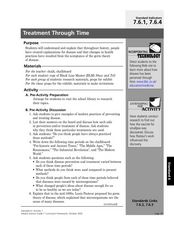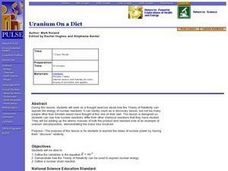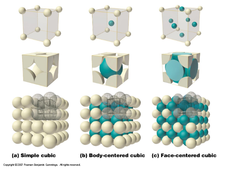Royal Society of Chemistry
A Solid-Solid Reaction between Lead Nitrate and Potassium Iodide
Why is it so difficult to make two solid compounds react? Investigate the concepts of particle collisions and rate of reaction using a quick demonstration. The colorful experiment features two plain, white solids combining to form a...
Brigham Young University
Understanding Design, Composition, and Color
The set for a play combines design elements (style, line, shape, mass, measure, position, color, and texture) and principles of composition (unity, harmony, contrast, variation, balance, proportion, and emphasis) to create a particular...
Education Closet
West Side Shifts
Combine math, language arts, music, and dance with an activity focused on "America" from West Side Story. After listening to the song, learners compare the film to Romeo and Juliet, analyze the song's meter, design choreography, plan...
Berklee College of Music
Create Your Own Afro-Latin Groove
The backbone of Latin American music is the beat! Young musicians work on blending Afro-Latin rhythms and beat patterns before incorporating the major pentatonic, minor pentatonic, and blues scales in their own compositions.
Biology Junction
Introduction to Biology
Welcome to Biology! Introduce pupils to a subject conceptualized by Aristotle in 300 BC through a presentation and worksheet. It covers the themes of biology, characteristics of life, the scientific method, microscopes, and measurements.
Princeton University
A Teacher's Guide to the Universe
Astronomers only observe four percent of the universe as the rest hides in darkness. The size, shape, and movement of the universe are the focus for an long-term high school unit. Its 43 lessons include hands-on experiments, direct...
Howard Hughes Medical Institute
Distribution of Elements in Earth’s Crust
How do scientists know the difference between a meteorite from space and a regular rock from the earth? Scholars read a passage and answer comprehension questions about the creation of the solar system. They extrapolate the main ideas to...
Skoog Music
St. Patrick’s Day
Traditional Irish music can bring even the most stoic audience to tears. This St. Patrick's Day, explore the lilting flutes and mournful ballads of the Emerald Isle with a interactive and inspiring music lesson.
California Department of Education
Consonance and Dissonance: Creating Intervals for Emotions (CTE)
How are music and emotion related? Using lesson plan two of four from the Changing One's Tune: A Music Therapy STEM Integrated Project Series, scholars explore the connection between the two topics. They learn to recognize different...
California Department of Education
Tension and Release: Creating Mindful Harmony (CTE)
Perhaps the Doobie Brothers said it best when they sang, "Listen to the Music." With the third of four lessons from the Changing One's Tune: A Music Therapy STEM Integrated Project series, pupils discover the connection between music and...
Cornell Lab of Ornithology
Jump, Glide, or Fly? Exploring Bird Evolution
How have birds evolved from prehistoric animals? With the three-part lesson, small groups first research different prehistoric animals and determine whether they are birds. Then, scholars explore different bird adaptations using the Flap...
American Museum of Natural History
Space and Time
Carve out some time to learn about space-time. Young scientists use a remote learning resource to read up on the relationship between space and time. They consider the idea of relativity, see how objects with a large mass can bend space...
American Museum of Natural History
What Do You Know About Astronomy
Develop an understanding of the universe. Learners answer 10 multiple choice questions about several topics in astronomy. Questions contain information about the age of the universe, gravitational attraction, galaxies, planets and comets...
PBS
Testing The Hypothesis
After choosing one experiment from the four they conducted in the previous lesson, young investigators analyze the evidence they collected to determine if it proves or disproves their original hypothesis.
NASA
The Big Climate Change Experiment Lesson 5: Climate Change Narratives
And now moving on to the next story. The last of five lessons in Unit 1: The Big Climate Change Experiment requires groups to create a script for a news segment on climate change. They either make a video of their story or conduct a live...
Smithsonian Institution
Songs, Sounds and Stories from the Georgia Sea Islands
American music is the result of the influence of many cultures, including the traditions brought by the African slaves. Young scholars study the polyrhythms, the call-and-response format, and the vocal improvisations of the Gullah...
Curated OER
Elegant Universe, The: Einstein's Dream
High schoolers visualize a universe with fewer than three spatial dimensions. They consider how more than three spatial dimensions could exist in the universe.
Curated OER
Introduction to Presidential Power
Twelfth graders describe the power of the President. In this Constitution lesson students reflect on the power given to the president of the United States by the wording in the Constitution. Students give their opinion.
Curated OER
Plate Tectonics Review
In this plate tectonics instructional activity, students review concepts such as the types of plate boundaries, the concept of continental drift, sea-floor spreading, earthquakes, and plate tectonics. They match 30 terms with their...
Curated OER
Treatment Through Time
Seventh graders explore how disease prevention and treatment changed throughout history. In this life science lesson, 7th graders create a classroom exhibit about this topic. They present their project to visitors.
Curated OER
Uranium On a Diet
Students examine how nuclear reactions differ from other chemical reactions they have studied. They add up atomic masses of both the product and reactant side of an example of uranium decomposition, demonstrating mass loss involved.
Curated OER
THE MANY COLORS OF SUNLIGHT
Students examine rainbow components, spectral colors, colors perceived by the eye, hot solids, glowing rarefied gas, absorption, that light is a wave, and optics.
Curated OER
Fallen Angels
Learners read the novel, Fallen Angels, and examine the theme of coming of age during the Vietnam War. They create timelines of the 1960s, highlighting important issues of the era. They write research papers focusing on one particular...
Curated OER
Plate Tectonics
Learners use lecture, maps and video to analyze the distribution of earthquakes and volcanoes. They relate this distribution to the theory of plate tectonics and conduct several experiments to illustrate the forces at work in this theory.
Other popular searches
- Number Theory
- Music Theory
- Atomic Theory
- Cell Theory
- Big Bang Theory
- Color Theory
- Economic Theory
- Music Theory Lesson Plans
- Theory of Evolution
- Germ Theory
- Continental Drift Theory
- Cell Theory Scientists















